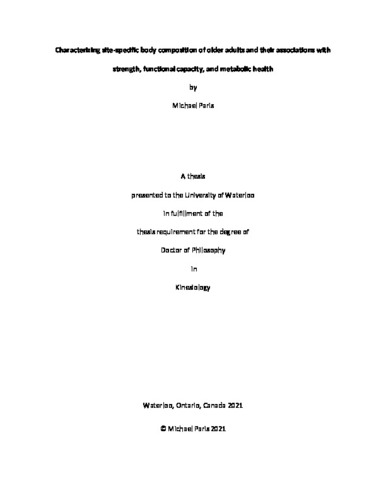| dc.description.abstract | Background: Ageing is associated with skeletal muscle atrophy and increased intramuscular adipose tissue. Emerging evidence indicates that specific muscle groups may be largely responsible for the ageing-related degradation of muscle mass and composition. However, how these site-specific measures of skeletal muscle mass and composition compare to traditional whole-body measures of body composition in relation to strength and metabolic health are not well understood. Our objectives were to: 1) characterize site-specific differences in skeletal muscle mass and composition between younger and older adults and 2) compare the associations between site-specific and traditional measures of muscle mass and composition with strength, functional capacity, and metabolic health of older adults.
Methods: Data for this thesis was derived from a prospectively recruited cohort of older males (n=32) and a secondary analysis of younger and older males and females (n=96). All participants underwent dual-energy x-ray absorptiometry analysis of regional and appendicular lean tissue and ultrasound measured muscle thickness and echo intensity (8 distinct landmarks). Older males in the prospective cohort were also evaluated for strength and a glucose tolerance test.
Younger and older adults were matched for relative muscle mass (study 1) and absolute fat thickness (study 2) to examine differences in muscle thickness and echo intensity, respectively. For studies 3 and 4, site-specific muscle thickness, echo intensity, and lean tissue were assessed in relation to muscle strength, functional capacity, and metabolic health of older males.
Results: For study 1, older adults exhibited significantly lower muscle thickness at the anterior upper leg (26% smaller) and anterior abdomen (36% smaller), but not regional lean tissue (0-15% smaller) compared with younger adults. In study 2, older adults presented with elevated muscle echo intensity (poorer muscle composition) at the anterior upper leg (28% higher) and anterior abdomen (58% higher), but not the anterior upper arm (11% higher) compared with the younger cohort. For study 3, both DXA appendicular lean tissue and site-specific muscle thickness provided similar magnitude associations with muscle strength. In study 4, elevated muscle echo intensity at the anterior upper leg was associated with poorer glucose homeostasis in healthy older males. However, in older males with prediabetes or diabetes, elevated skeletal muscle echo intensity was associated with better glucose homeostasis.
Conclusions: The anterior upper leg and anterior abdomen display substantial reductions in muscle thickness and increases in echo intensity with advancing age. In relation to muscle strength, both appendicular lean tissue and site-specific muscle thickness provided similar magnitude of associations. Elevated muscle echo intensity is associated with poorer glucose homeostasis in healthy older males but displays divergent associations in older males with prediabetes and diabetes. These divergent associations require further clarification to better understand the validity of echo intensity as a metric of skeletal muscle composition. | en |

